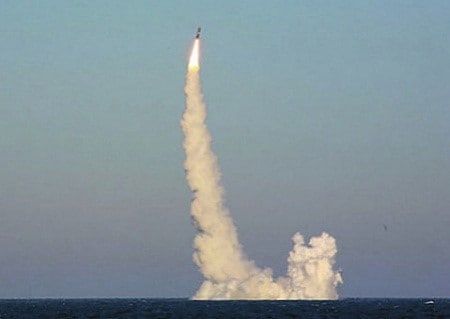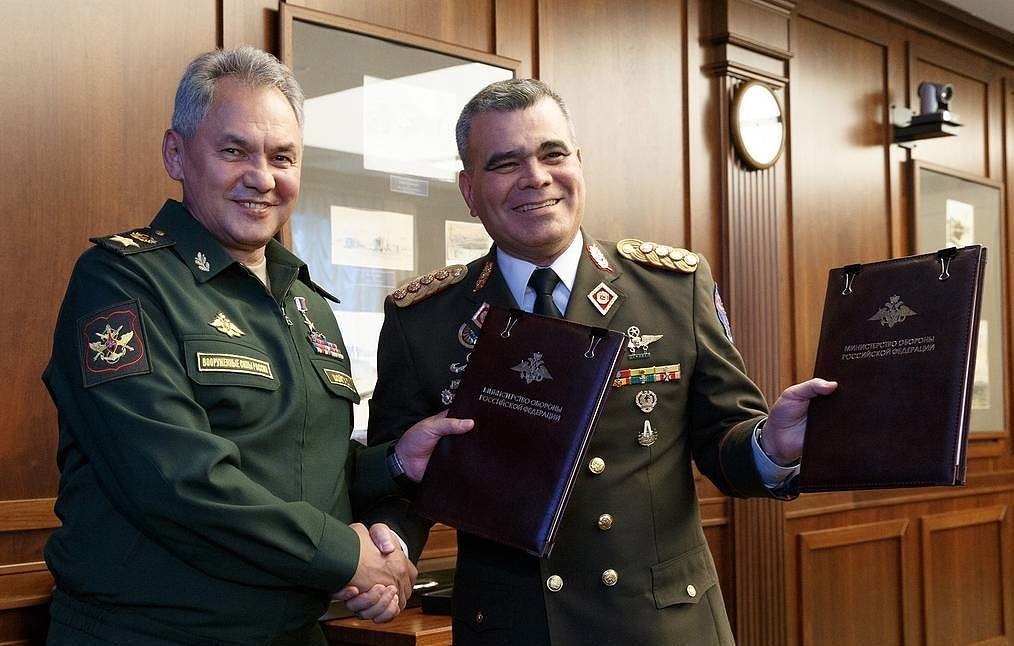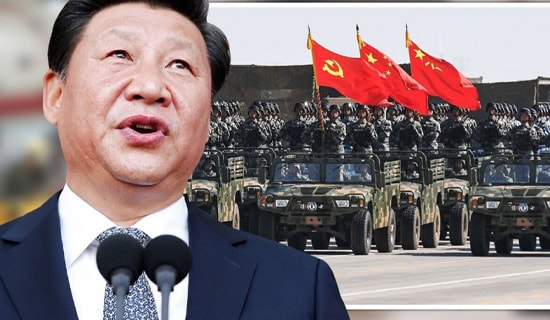The Russian media outlet Nezavisimaya Gazeta (Ng.ru) has reported that Russia may deploy Kalibr missiles in the Caribbean, in order "to neutralize" potential threats from the new U.S. weapons.
According to the report, Moscow is increasing its presence near the U.S. borders and plans to deploy Russian strategic aviation on Venezuela's La Orchila Island in the Caribbean.
Reiterating that Moscow has an agreement with Nicaragua on a simplified procedure for Russian warships' entry into the latter's ports, the report noted that a similar agreement may be signed with Cuba, since Havana has repeatedly stated its desire to continue the naval cooperation with Moscow that dates back to the Soviet era.
Below is the article, published in Nezavisimaya Gazeta:[1]

(Source: Ng.ru)
"Russia Can Already Respond Symmetrically To The U.S. Attempts To Create Weapons That Previously Fell Under The Scope" Of The INF Treaty
"Russia can already respond symmetrically to the U.S. attempts to create weapons that previously fell under the scope of the Treaty on the Elimination of Intermediate-Range and Shorter-Range Missiles (INF Treaty). This opinion was expressed by Ng.ru military experts, commenting on Vladimir Putin's instructions to the Defense Ministry and to the Russian Foreign Ministry to 'take exhaustive measures' in connection with the new cruise missile (land-based Tomahawk) tests carried out August 18 by the U.S. These are geopolitical measures, for the implementation of which Russia has international treaties and a legal framework with some Latin American states.
"As military expert Major-General Vladimir Bogatyrev told Ng.ru, 'Russia has legal grounds to deploy its submarines and ships with medium- and shorter-range naval missiles, in the relative proximity of U.S. borders, as a response to the appearance of new weapons at U.S. disposal, after their withdrawal from the INF.'
"Bogatyrev, who headed a Russian Defense Ministry department until his dismissal, reiterated that on August 15, Defense Minister Sergei Shoigu and Venezuela Defense Minister Vladimir Padrino Lopez had signed an agreement about mutual visits of warships from the two countries. 'Venezuela has excellent seaports where Russian Navy ships and submarines can regularly enter and resupply, and then carry out combat missions off the coast of North America,' the expert [Bogatyrev] said."
SUPPORT OUR WORK


Russian Defense Minister Sergei Shoigu and Venezuelan Defense Minister Vladimir Padrino Lopez on August 15. (Source: Tass.com)
Moscow Is Increasing Its Presence Near U.S. Borders, Plans To Deploy Russian Strategic Aviation On La Orchila Island
"[Bogatyrev] pointed out that almost every new surface ship of the oceanic zone of Russia's navy, as well as new diesel-electric submarines, are now armed with medium-range 3M-54 Kalibr cruise missiles, which underwent a trial by fire in Syria.
"In 2015-2017, the frigates Admiral Essen and Admiral Grigorovich, and as well as the submarines Krasnodar, Veliky Novgorod, and Kolpino, fired Kalibrs missiles at militants from a distance of over 2,000 km. 'These are the ships and submarines that can perform missions in the Caribbean Sea and the Pacific and Atlantic Oceans,' [Bogatyrev] said.
"In addition, according to him, 'one of the measures to neutralize potential threats from the new U.S. weapons, including the recently tested U.S. cruise missile, could be a hypersonic weapon. In particular, it is the Zircon missile, capable of hitting ground and surface targets at ranges of over a thousand kilometers.' The general [Bodatyrev] noted that the Zircon missile, which is capable of a speed of about nine Mach, is designed to arm the Yasen-M and Husky multipurpose nuclear submarines, as well as surface ships.
"A similar opinion was expressed by Alexander Sherin, First Deputy Chairman of the State Duma Committee on Defense. He believes that Moscow should talk with the Venezuelan leadership about the deployment of missiles banned by the INF Treaty: 'It is, of course, a tough [decision]. Maybe there will even be a Caribbean crisis No. 2, but it was the Caribbean crisis that compelled the Americans to cool down for a long time. If such a system is deployed in Venezuela, the U.S. will behave more carefully.'
"Ng.ru has already written that in the context of a possible termination of nuclear disarmament treaties, Moscow is increasing its presence near the U.S. borders, and plans to deploy Russian strategic aviation on one of the Venezuelan islands (La Orchila Island) in the Caribbean Sea...
"'This idea has not yet been implemented,' General Bogatyrev told Ng.ru. 'However, there is already an agreement for Russian Navy ships entering Venezuela's ports. And this is very important from the military-strategic point of view, as, in the Russian army, only Russian Navy ships are equipped with smaller and medium-range missiles.' The expert noted that Moscow has an agreement with Nicaragua on a simplified procedure for Russian warships' entry into that country's ports (signed in February 2015). It is possible that a similar document will be signed with Cuba, since Havana has repeatedly stated its desire to continue its naval cooperation with Moscow dating back to the Soviet era."
Russia Has Many Options To Warn The US Against Deploying Missiles Previously Prohibited By The INF Treaty

"On August 24, in accordance with the combat training plan, the Sineva sea-based ballistic missile and the Bulava missile were successfully launched from the Tula and Yuri Dolgoruky strategic submarines," the Defense Ministry said in a statement. (Source: Tass.com)
"Oleg Shvedkov, captain of the 1st rank and chairman of the Central Committee of the All-Russian Military Forces Trade Union, told Ng.ru that 'the possible permanent presence of Russian warships off the U.S. coast equipped with medium and shorter range missiles will certainly be a headache for them.' 'So far, experts have been talking about this within the framework of an information confrontation,' Shvedkov said. 'It will be very costly for Russia to keep its military fleet off the coast of North America – although during the Soviet era, our diesel submarines regularly came to Cuba, annoying the Americans. And the nuclear-powered ships were carrying combat patrols in the vicinity of the U.S. coast under water. Now this can happen again, if our fleet becomes a regular guest of the American contingent.'
"'Russia maintains nuclear missile parity with the U.S. thanks to its Strategic Nuclear Forces, in which the naval component plays an important role,' the expert believes. He notes: 'The successful launch of the Sineva and Bulava intercontinental ballistic missiles (ICBMs), from Russian submarines on August 24, can hardly be considered Moscow's symmetrical response to the recent U.S. trials of a medium-range cruise missile. These ICBMs fall under the ongoing Russian-American Strategic Arms Reduction Treaty (START-3). This is also indicated by the Defense Ministry information, which stated that the ICBM launches were carried out in accordance with the combat training plan.'
"Thus, Russia has many options to ensure its security and to warn the U.S. against deploying missiles previously prohibited by the INF Treaty. According to military expert Major General Vladimir Dvorkin, in addition to military diplomatic steps and information countermeasures, the Russian Federation is currently prepared with a 'very simple answer': Kalibr, which is compatible with ships but can be also deployed on a self-propelled land-based launcher, 'although these are non-nuclear cruise missiles and they are not of any strategic nature,' he said.
"'If the Americans deploy their missiles (meaning medium- and shorter-range missiles) in the Asia-Pacific region, which is what they want to do, we're going to have to think about the answer,' said Dvorkin, who previously ran the 4th Central Research Institute (a nuclear-missile research institute). 'We can't deploy much there, because of a strategic ally, China. Therefore, I think that the pace of deployment of Kalibrs in the region will be insignificant.'"
[1] Ng.ru, August 29, 2019. The article was written by Vladimir Mukhin.




